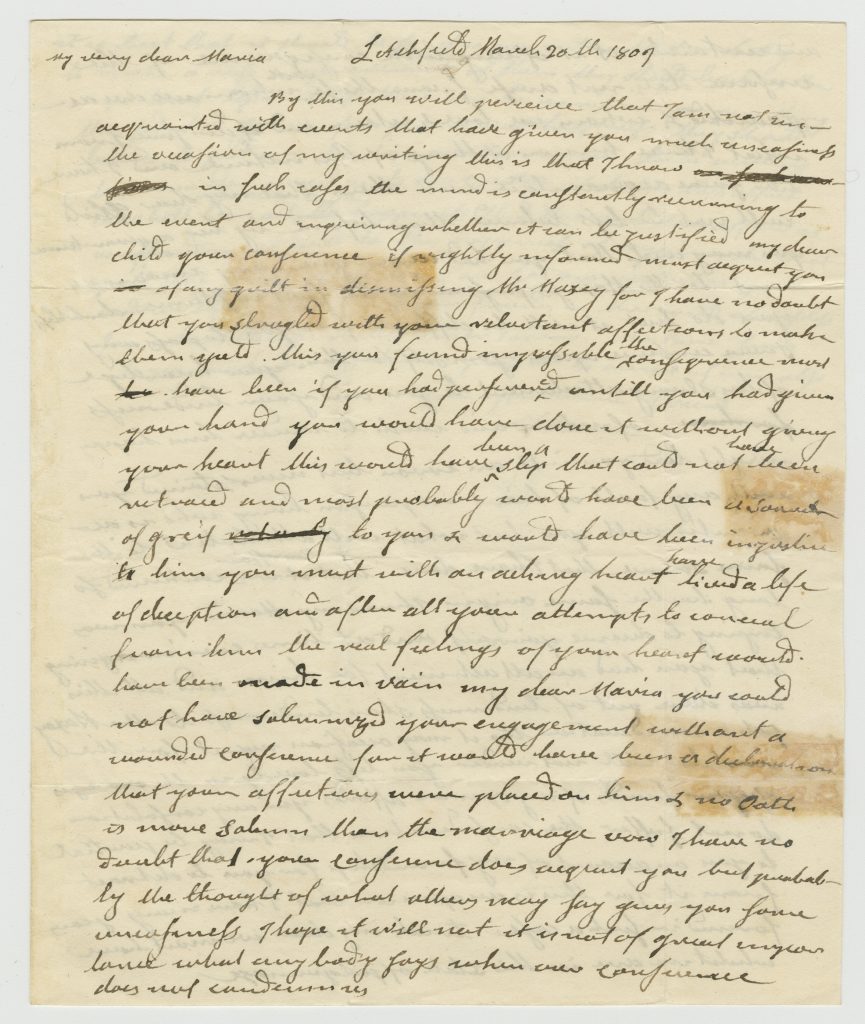
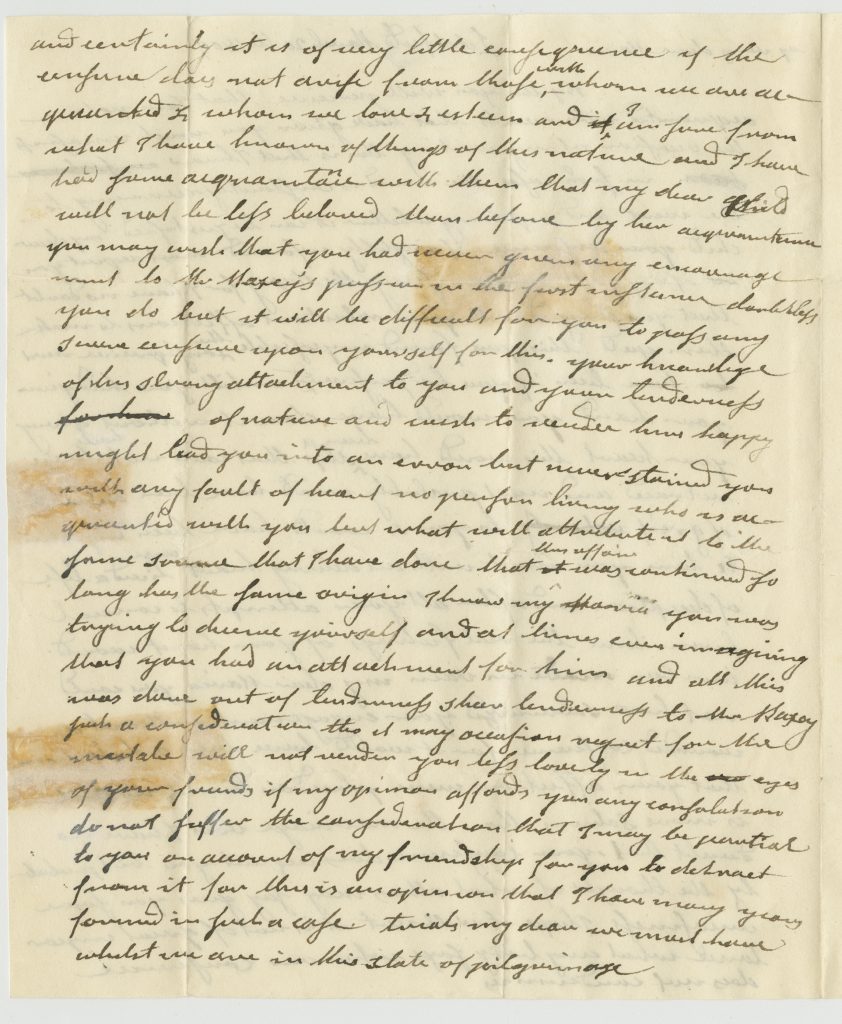
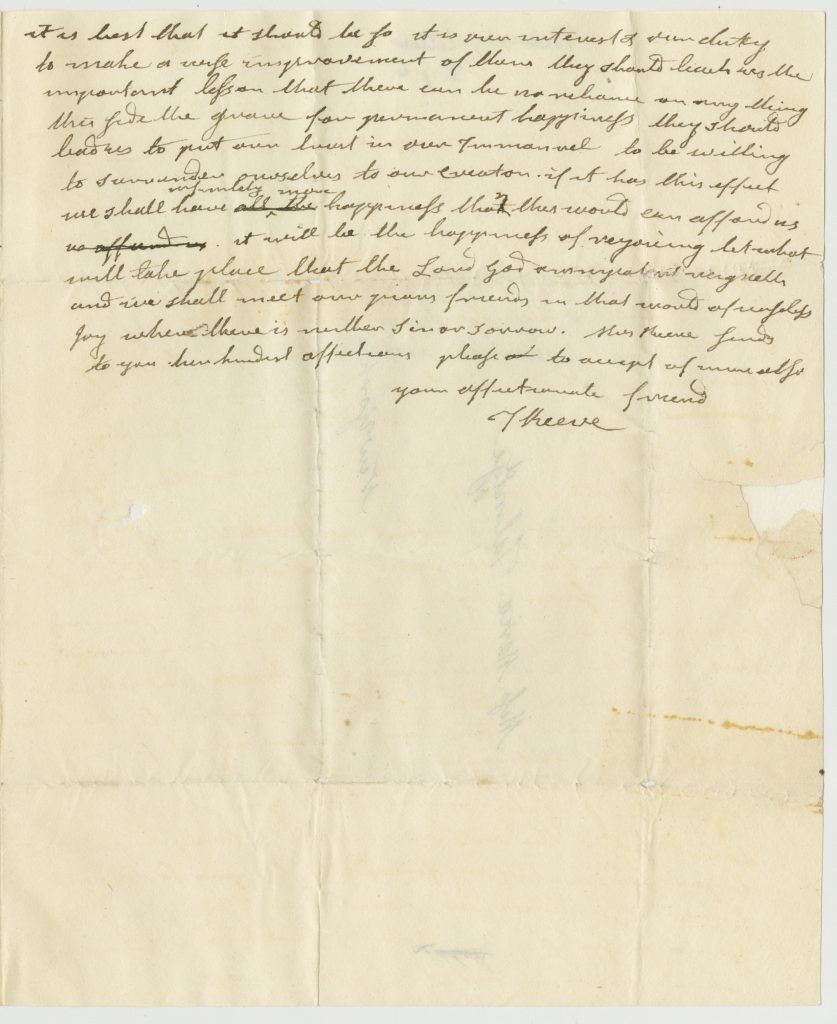
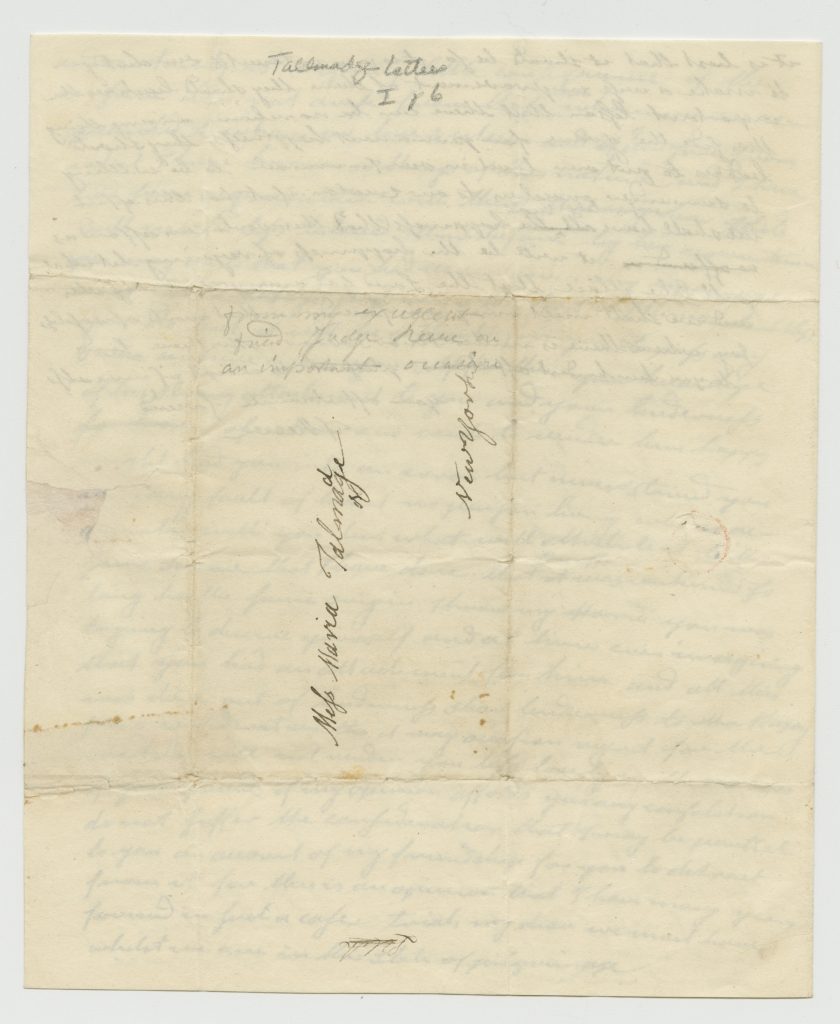
Maria Tallmadge was the daughter of Colonel Benjamin Tallmadge and Mary Floyd Tallmadge. She was born in Litchfield in 1790 and attended the Litchfield Female Academy from 1802-1802. According to Emily Noyes Vanderpoel’s Chronicles of a Pioneer School, Tallmadge “took a prominent part in the school theatricals.” Virgil Maxcy was from Attleboro, MA. He was born May 5, 1785 to Levi and Ruth Newell Maxcy. Following his graduation from Brown College, Maxcy studied law in Litchfield, where the two likely met.
In 1807, rumors of a broken engagement led Tapping Reeve to write the letter shown above to Maria. He consoled her that, “your conscience if rightly informed must acquit you in of any guilt in dismissing Mr Maxcy for I have no doubt that you struggled with your reluctant affections to make them yield.” Believe it or not, this is some of the best handwriting we’ve seen from Reeve! A full transcription is pasted below.
Despite the gossip, Maxcy must have pushed forward with his pursuit. He wrote a letter to Maria in 1809 in which he reminisced, “This evening, my beloved Maria is the anniversary of that, on which you acknowledged you loved me. At such a time, how many interesting recollections throng to my heart and swell it with emotion. I almost fancy myself seated by your side on the threshold of your father’s door in Litchfield. I almost fancy I see the mild beams of the moon sleeping upon the quiet scene and diffusing serenity and peace: the joy I felt then at your consenting to take a seat and suffering me to be so near you, revives again in my bosom: but more than all the image of my Angel Maria, declining her head towards her bosom while owning that she loved, rises like a vision of paradise upon my mind and revives the rapture, which thrilled thro’ my whole frame and almost deprives me of the power of utterance.”
In a possible reference to a prior rejection, Maxcy wrote: “And, surely if an attachment strong as it was Sincere, tried by disappointment and proved by perserverence, merits success, mine was not unworthy of it.” The pair were both teased about the affair, he in Baltimore where he had gone to practice law, and her in Litchfield. In the end, he was wrong. It’s unclear how their engagement was broken. No correspondence regarding the matter has been found.
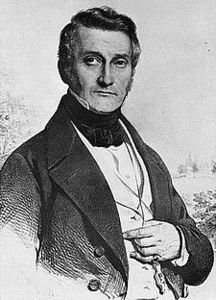
Maxcy married Mary Galloway, the daughter of a slave trader and plantation owner in Maryland. I have found no documentation of their marriage, but several sites including find-a-grave date their nuptials to 1811. To learn more about his ultimate (and quite shocking) fate, visit his Ledger page.
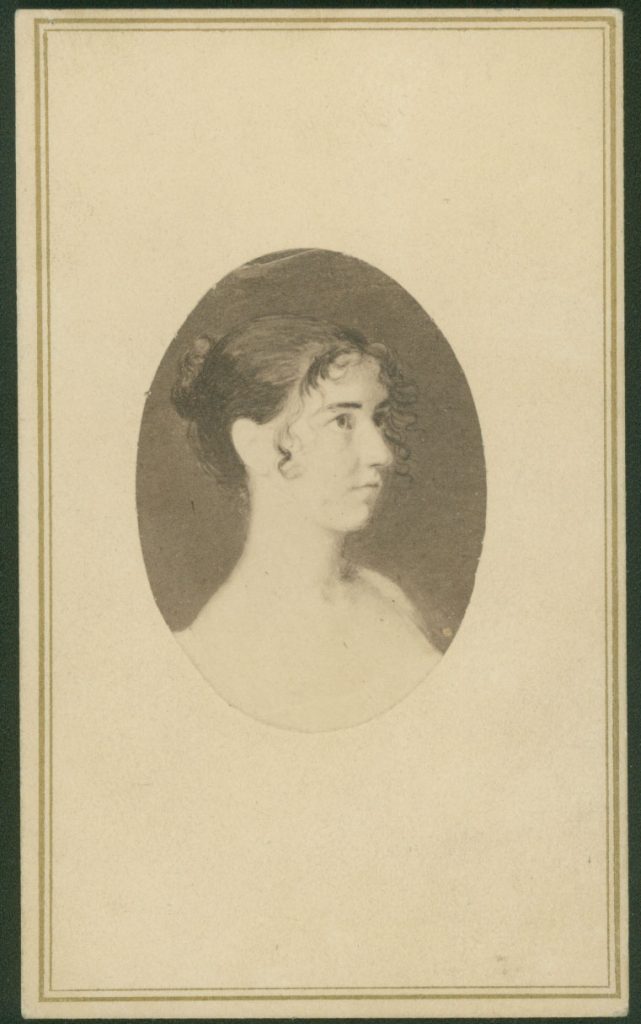
Photograph of a portrait of Maria Tallmadge Cushman, Collection of the Litchfield Historical Society, Helga J. Ingraham Memorial Library
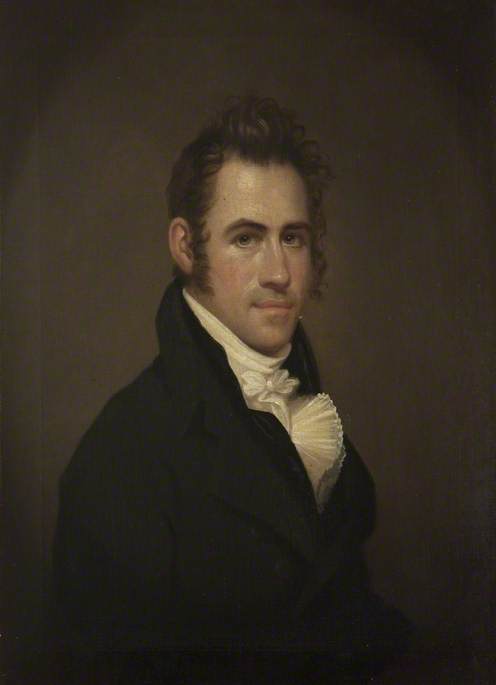
Ames, Ezra; John P. Cushman of Troy, New York (1784-1848); The American Museum in Britain; http://www.artuk.org/artworks/john-p-cushman-of-troy-new-york-17841848-40892
Maria Tallmadge married John Paine Cushman, also a student of the Litchfield Law School. Cushman came to Litchfield in 1808 and married Maria in 1812. Cushman was the son of Judge Isaac and Sarah (Paine) Cushman. The couple resided in Troy, NY and had eight children. They were frequent correspondents of her father, Benjamin Tallmadge. Cushman served in various public offices including the United States Congress.
Litchfield March 20th
1807 My very dear Maria
By this you will perceive that I am not unacquainted with events that have given you much uneasiness the occasion of my writing this is that I know on such occasion in such cases the mind is returning to the event and inquiring whether it can be justified my dear child your conscience if rightly informed must acquit you in of any guilt in dismissing Mr Maxcy for I have no doubt that you struggled with your reluctant affections to make them yield. This you found impossible ^the consequence must have been if you had preserver^ed until you had given your hand you would have done it without giving your heart this would have ^been a step that could not have been retraced and most probably would have been a source of grief not only to you & would have been injustice to him you must with an aching heart have lived a life of deception and after all your attempts to conceal from him the real feelings of your heart would have been made in vain my dear Maria you could not have solemnized your engagement without wounded conscience for it would have been [a declaration?] that your affections were placed on him & no oath is more solemn than the marriage vow I have no doubt that your conscience does acquit you but probably the thought of what others may say gives you some uneasiness I hope it will not it is not of great importance what anybody says when our conscience does not condemn us
[p2] and certainly it is of very little consequence if the [censure?] does not arise from those ^with whom we are acquainted & whom we love & esteem and if ^I am sure from what I have known of things of this nature and I have had some acquaintance with them that my dear child will not be less beloved than before by her acquaintances you may wish that you had never given any encouragement to Mr Maxcy’s [passion?] in the first instance doubtless you do but it will be difficult for you to pass any severe censure upon yourself for this- your knowledge of his strong attachment to you and your tenderness for him of nature and wish to render him happy might lead you into an error but never stained you with any fault of heart no person living who is acquainted with you but what will attribute it to the same source that I have done that it this affair was continued so long has the same origin I know my Maria you was trying to deceive yourself and at times even imagining that you had an attachment for him and all this was done out of tenderness show tenderness to Mr Maxcy [such a ? torn] tho it may occasion regret for the [mistake?] will not render you less lovely in the eyes of your friends if my opinion allows you any consolation do not suffer the consideration that I may be partial to you on account of my friendship for you to detract from it for this is an opinion that I have many years found in such a case trials my dear we must have whilst we are in this state of pilgrimage
[p 3] it is best that it should be so it is our interest & our duty to make a wise improvement of [them?] they should teach us the important lesson that there can be no reliance on any thing this side of the grave for permanent happiness they should lead us to put our hear in our Immanuel to be willing to surrender ourselves to our creation if it has this effect we shall have all ^infinitely more the happiness thatn this world can afford us us afford. it will be the happiness of rejoicing let what will take place that the Lord God our [?] and we shall meet our pious friends in that world of ceaseless joy where there is neither sin or sorrow. Mrs. Reeve sends to you her kindest affections please at to accept of mine also
Your affectionate friend
T Reeve
[Reverse] Miss Maria Talma^dge New York [Right margin in pencil] from my excellent friend Judge Reeve on an important occasion
Other resources consulted:
Brickley, Lynne Templeton, Sarah Pierce’s Litchfield Female Academy, 1792 – 1833, 1985
Galloway, John, -1810, Samuel Galloway, Francis Markoe, and Virgil Maxcy. Galloway-Maxcy-Markoe families papers. Manuscript/Mixed Material.